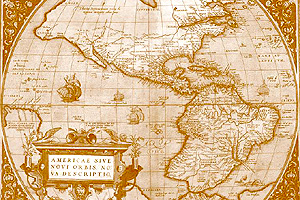Faculty to open discussion on new way to study Americas
By Jennifer CarnigNews Office
 | |
New paradigms are not often easy to usher into the academy, but during the past year, a group of more than a dozen faculty members in the Division of the Humanities have been meeting regularly to debate and contemplate a new approach to the study of the Americas.
On Friday, Nov. 18, the Project Towards a New Americas Studies working group is taking its discussion public with a one-day symposium. At this event, humanists and historians will critically examine the methodological challenges and political implications of a “hemispheric” approach to the study of the cultures and histories of the Americas. This emerging belief that culture can transcend geography encourages a discipline shift in the study of some people, objects and ideas. By acknowledging the shared, although not equivalent, histories of colonialism that have shaped the cultures of the region, the symposium seeks to reflect on the potential productivity of such an approach.
Language and national borders have been the preferred organizing criteria for the study of cultures of the Americas for years, especially in the literary and art history fields, said Agnes Lugo-Ortiz, chair of the Project Towards a New Americas Studies and Associate Professor in Romance Languages & Literatures. But categories such as “U.S./American literature” or “Mexican literature,” while productive, can take you only so far. A reconsideration of these categories may serve to draw attention to processes of displacement and dispersion, to the circulation of people, objects and ideas, and to the new cultural geographies that these mobilizations effect.
“A greater attentiveness to commercial exchanges, cultural exchanges and migration — by opening things up and going beyond the limitations imposed by the paradigm of the nation state — could really help us to produce new forms of knowledge,” Lugo-Ortiz said. “It can help us think about cultural issues in a different and, perhaps, more dynamic manner.”
Lugo-Ortiz, who previously has published on literature and nationalism in Cuba, is currently writing a book on the cultures of slavery in colonial Cuba. Slavery, she said, is a “perfect example” of how a new approach in scholarship may enhance our understanding of certain cultural processes.
“You can’t limit your work to a single country when you’re studying a phenomenon that implicates diverse geographic regions,” she said. “If I’m studying the slave narrative in Cuba, I must pay attention both to the local and to the transatlantic dynamics within which these texts acquire their broader cultural and historical significance.”
At the symposium, panelists and audience members are invited to critically interrogate this idea, which, even if a good idea, Lugo-Ortiz said, also carries political implications.
“The production of knowledge always impacts a social reality. We need to look at what is at stake in this paradigm.”
Workshops on “Literary TransAmericanisms” and “Visual Economies of the Americas” include faculty members from Romance Languages & Literatures and English Language & Literature, as well participants from such institutions as the University of Colorado, the University of Michigan and Dartmouth College.
The keynote session on “Why Americas Studies?” brings two esteemed scholars to the University: Felipe Fernández-Armesto, a prominent historian at Tufts University and the author of, The Americas: A Hemispheric History, and Diana Taylor, professor of performance studies and Spanish at New York University and the founding director of the Hemispheric Institute of Performance and Politics.
The free conference runs from 9 a.m. to 7 p.m. on Friday, Nov. 18, in Room 405, Rosenwald Hall, 1101 E. 58th St.
For more information, access to the workshop papers, registration, and a complete schedule, visit http://newamericas.uchicago.edu, e-mail swlund@uchicago.edu or call (773) 702-8512.
![[Chronicle]](/images/sidebar_header_oct06.gif)